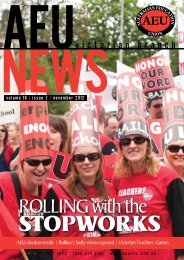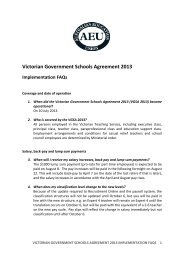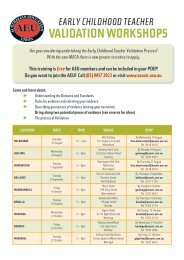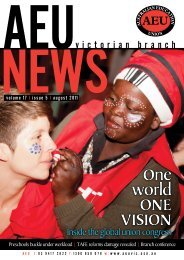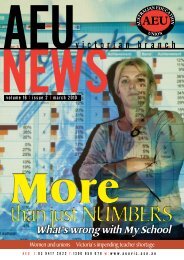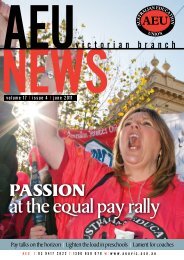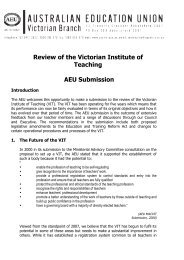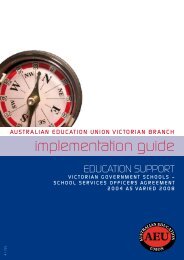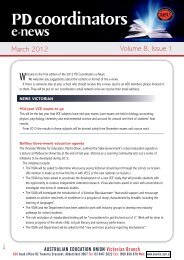Australian Education Union, Victorian Branch
Australian Education Union, Victorian Branch
Australian Education Union, Victorian Branch
Create successful ePaper yourself
Turn your PDF publications into a flip-book with our unique Google optimized e-Paper software.
A 2007 report into pay by the <strong>Australian</strong> Council<br />
for <strong>Education</strong>al Research (ACER) commissioned by the<br />
Federal Government concluded: “Few merit-based pay<br />
schemes have survived when applied to teaching.”<br />
It found that they led to staff dissatisfaction and<br />
dissension and that there was no evidence that they<br />
improved student performance.<br />
The report dismissed the idea that financial<br />
incentives can improve what teachers know or can do,<br />
or lead them to teach more effectively.<br />
A growing number of recent American studies<br />
(New York, Nashville, Houston, Iowa, Texas, Denver<br />
and Chicago) of schemes very similar to the <strong>Victorian</strong><br />
Government’s proposal have found that they have<br />
either no effect on student achievement or a negative<br />
effect.<br />
They also highlight the statistical invalidity and<br />
educational and professional distortions required in<br />
using student results to measure teacher performance.<br />
Further, they have found no significant impact<br />
on outcomes such as teacher motivation and<br />
retention.<br />
The New York bonus program, which influenced<br />
the make-up of the <strong>Victorian</strong> Teacher Rewards<br />
scheme, was recently abandoned by New York City<br />
authorities as a complete failure.<br />
Among other things it illustrated the perils of<br />
substituting a bonus system for an enforceable<br />
salary agreement. In the 2008–9 school year, more<br />
than 80% of participating NY schools won bonuses,<br />
costing the city $31 million. In 2009–10, that fell<br />
below 15% and cost $4m, after the state made its<br />
school tests harder.<br />
Closer to home, in a press release on May 2<br />
Premier Baillieu announced that the bonus scheme<br />
operating in his Department of Premier and Cabinet<br />
was to be “phased out”.<br />
You would never guess from the State<br />
Government’s proposals that <strong>Victorian</strong> teachers (as<br />
evidenced by the superior achievement of the state’s<br />
students nationally and internationally) are among the<br />
nation’s best.<br />
This success has been built through a system<br />
which values collaboration rather than competition<br />
between teachers. The clear evidence from recent<br />
evaluations and surveys of teacher opinion is that<br />
they do not want a competitive performance-based<br />
pay system.<br />
They do not want a system where bonuses to<br />
one group of teachers come from downgrading the<br />
salaries of another group.<br />
They do want salaries that are competitive with<br />
similar professional occupations and commensurate<br />
with the value of their social and economic contribution<br />
to the community.<br />
They also want Ted Baillieu and his Government to<br />
demonstrate that their election commitment to make<br />
teachers the best paid in Australia was not what it<br />
looks like now — a cynical con job. ◆<br />
John Graham is a research officer at the<br />
AEU <strong>Victorian</strong> branch.<br />
Ian Willson, a maths teacher at Fitzroy High<br />
School, said the Government’s conditional<br />
pay offer “sends a chill through us. To talk<br />
about decreasing preparation time and<br />
adding more teaching time shows the<br />
Government has no understanding of what<br />
we do on a day-to-day basis.”<br />
Joanne Heyman, a Deaf teacher<br />
of the Deaf at Pearcedale Primary<br />
near Frankston, said funding cuts<br />
meant deaf students’ access to<br />
school transport at her school had<br />
been restricted, as was her access to<br />
professional development .<br />
State Government funding cuts leading<br />
to the demise of the Auslan course at<br />
Kangan Institute also angered her.<br />
History teacher Tim Lambert from Bundoora Secondary College stopped work<br />
because he is sick of being treated “as being at the bottom of the food pile”. He said<br />
the Baillieu Government was making the performance of its Labor predecessor “look<br />
good”.<br />
The Baillieu Government’s treatment of the profession was “death by disdain and it<br />
won’t end here today. Kids who need the most from the education system are getting<br />
the least.”<br />
Principal Sue Muscat said the Government had gone “too far” in removing schools’<br />
component of the <strong>Education</strong> Maintenance Allowance. She said that 45% of Years 7<br />
to 10 students at Bundoora received the EMA. Bundoora’s component of this funding<br />
— amounting to “tens of thousands of dollars” — was used to help many students<br />
attend excursions and camps and pay for breakfast and lunch clubs, uniforms and<br />
learning resources. Losing this money “will have a direct, significant impact on low<br />
SES kids”.<br />
Bundoora will lose its VCAL coordinator next year as a result of the Government’s<br />
VCAL funding cuts. “I’ve done all I can to keep the coordinator’s position this year but<br />
I can’t keep finding $50,000 from somewhere to pay for her,” Muscat said.<br />
campaign<br />
www.aeuvic.asn.au 15



